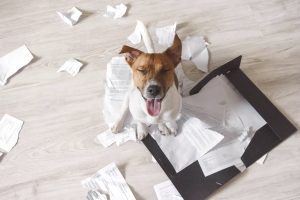My Dog Ate My Homework: Intestinal Blockage in Pets
 “The dog ate my homework!” Is this age-old classroom excuse a reality in your home? If you have a pet who enjoys taking the occasional chomp out of objects around your home, he or she runs the risk of winding up with an intestinal blockage.
“The dog ate my homework!” Is this age-old classroom excuse a reality in your home? If you have a pet who enjoys taking the occasional chomp out of objects around your home, he or she runs the risk of winding up with an intestinal blockage.
Intestinal blockage in pets, also called gastrointestinal obstruction or bowel obstruction, is a fairly common condition. Although all pets are at risk for intestinal blockage, dogs tend to be at higher risk than cats because of their tendencies to eat everything.
Besides being extremely painful, an intestinal blockage puts your pet at risk for serious health consequences. Being aware of the causes and symptoms of intestinal blockage in pets is critical in protecting your pet from this potentially life-threatening condition.
Causes of Intestinal Blockage in Pets
Intestinal blockage occurs when an animal ingests something that is too large to pass through the intestinal tract. When this happens, the object stops the flow of nutrients ingested into the body and/or secretions from the stomach into and through the intestines. Stuck objects can cause a pet considerable pain. Damage to the gastrointestinal tissues can result in toxins being released into the body, as well as cell death.
Symptoms
Seek veterinary assistance if you notice any of the following symptoms in your pet:
- Vomiting
- Diarrhea
- Straining to defecate, constipation
- Abdominal tenderness or pain
- Loss of appetite
- Weakness
- Weight loss
- Behavioral changes, such as biting or growling when picked up
Treatment
Once your veterinarian has confirmed the existence of an intestinal blockage, your pet will need treatment. Treatment may include:
- Administration of fluids to treat dehydration and electrolyte imbalance
- Removal of the foreign body obstruction, either by inducing vomiting or with an endoscope, or surgery if the object has made its way to the intestine
- If any bowel tissues have been damaged, those sections will need to be removed surgically
- If your pet has experienced bloat or torsion as a result of the intestinal blockage, your veterinarian will correct this condition
- Antibiotics will be prescribed following surgery to reduce the chance of infection (your pet may also be prescribed medications to treat vomiting or stomach upset)
Preventing a Bowel Obstruction
As with most things in life, it’s easier to prevent your pet from winding up with an intestinal blockage than it is to treat one. Limit your pet’s access to tempting items by:
- Keeping garbage can lids closed and putting leftovers away immediately to prevent scrounging (cooked bones are especially dangerous for pets, as they can splinter and become lodged in the intestine)
- Discouraging dogs from picking up tempting items that are not intended for consumption by storing them on high shelves or locked in cabinets
- Keeping string and tinsel away from cats, as these items are commonly swallowed during playing and may result in a bowel obstruction
- Avoiding certain types of dog treats that can become lodged in your pet’s GI tract, such as pig ears and rawhide bones (call us for safe treat recommendations)
As always, if you have any questions or concerns, don’t hesitate to contact your team at Dupont Veterinary Clinic.
